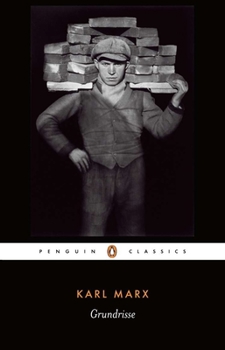Grundrisse: Foundations of the Critique of Political Economy
Select Format
Select Condition 
Book Overview
Written during the winter of 1857-8, the Grundrisse was considered by Marx to be the first scientific elaboration of communist theory. A collection of seven notebooks on capital and money, it both develops the arguments outlined in the Communist Manifesto (1848) and explores the themes and theses that were to dominate his great later work Capital. Here, for the first time, Marx set out his own version of Hegel's dialectics and developed...
Format:Paperback
Language:English
ISBN:0140445757
ISBN13:9780140445756
Release Date:November 1993
Publisher:Penguin Group
Length:912 Pages
Weight:1.40 lbs.
Dimensions:1.6" x 5.1" x 7.7"
Age Range:18 years and up
Grade Range:Postsecondary and higher
Customer Reviews
5 ratings
The Only True Marxist Primer for Understanding ' Das Kapital'.
Published by Thriftbooks.com User , 16 years ago
This economic political classic sets the stage for Marx' masterpiece ,'Das Kapital'.It presents the Marxist view of economic labor theory and other radical issues concerning the public socialization of capitalistic economies.After reading this interesting monetary classic,I felt as if socialism can only compliment capitalism and never completely replace it.There needs to be a constant flux of balance between the two systems.During the days of the Industrial Revolution,the shift and focus was on absolute capitalism,unrestrained by indifferent royalists.After the the Russian Revoltion,the emphasis was on a centrical labor socialist oligarchy,with no blue-blood royalist tax restrictions.Under the reforms of Boris Yeltsin ,Russia moved to a more capitalist system ,in which some business gamblers lost everything.Putin has moved Russia back to a more centralised economy and perhaps refining the previous economic blunders of the Soviet Era.This book will help nuture a budding economics thinker by offering more philosophical avenues of free-thought and political choice.
The Rosetta Stone
Published by Thriftbooks.com User , 18 years ago
The Grundrisse is perhaps one of the most important additions to Marxian scholarship in the last fifty years and stands as a true Rosetta Stone for deciphering Marx(ist, ian, oid) thought. Foundations of the Critique of Political Economy stands as a bridge between the early humanist writing such as the Manifesto and the later scientific Marx as seen in the three volumes of Capital. In this text we see the very beginnings of the scientific critique as well as a brilliant display of Marx as the dialectician that forces the astute and serious reader to rethink the engagement between Marx and Hegelian thought. This work has seriously challenged what I thought I knew about Marx and has sent me into a deep reflection on Hegel. This work is a must read for those serious about engaging critically the works of a Karl Marx.
Tough but Worthwhile
Published by Thriftbooks.com User , 21 years ago
A collection of seven notebooks on capital and money, drafted during the winter of 1857-8, exploring the themes and theses that dominate his later writings, including Marx's own version of Hegel's dialectics, and thoughts on alientation. While not as sophisticatedp--or lengthy--as Das Kapital, it remains a "must read" for anyone interested developing a sophisticated understanding of Marxist philosophy.
Critical Reading
Published by Thriftbooks.com User , 23 years ago
Unlike many other works, the Grundrisse exposes in more obvious ways Marx's dialectical thought. The Introduction should really be read as a great antidote to the 1859 Preface to a Critique of Political Economy, which gave us the base-superstructure analogy. The weakest link in Marx's though may very well be found there. The Grundrisse Introduction starts from the point of view of class struggle, whereas there is no place for the class struggle as the driving force in the base-superstructure schema.Also, Grundrisse starts in a different place from Capital. There is a reason for this, and a good discussion of this can be found in the writing of Raya Dunayevskaya and a counter discussion can be found in Roman Rosdolsky. The choice to eventually shelve the organization of the Grundrisse for the organization of Capital flows in part from the changes in the intervening years, most notably the U.S. Civil War.Real life constantly shaped Marx's thinking, hardly fitting the representation we commonly get of him from ideologues and capital's priests (economists). As a result, Grundrisse also has serious limitations in its understanding of the logic of capital. Basing the entire understanding of Marxism and capital on Grundrisse leads to the kind of mistakes made by Italian Autononmist Marxism, esp. Antonio Negri, who find themselves engaged in a very subjectivist understanding of capitalism. A useful, but sympathetic, antidote can be found in Werner Bonefeld and John Holloway's writings.
A classical of marxian economic thought
Published by Thriftbooks.com User , 24 years ago
This book is a sketch of what would become, a couple of years later, the author's masterpiece: Das Kapital. It was written in an intense effort during revolutionary agitations in Europe, such hard work had as goal to show the inherent contradictions of capitalism and the way it would soon collapse. Well, capitalism did not collapse then and did not so far, but this book remains a classic in the critique of classical political economy. It is indded shorter than Das Kapital, and in parts not as mature as, but it has the advantage of providing discussion on themes not discussed elsewhere in marxian works. Thus, the most famous part of Grundrisse are its Introduction and the part on "Pre-capitalistic modes of production". A must for anyone who wish to get acquainted with marxian thought.




